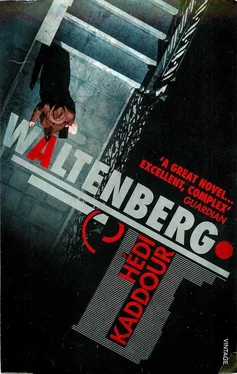Hedi Kaddour - Waltenberg
Здесь есть возможность читать онлайн «Hedi Kaddour - Waltenberg» весь текст электронной книги совершенно бесплатно (целиком полную версию без сокращений). В некоторых случаях можно слушать аудио, скачать через торрент в формате fb2 и присутствует краткое содержание. Год выпуска: 2009, Издательство: Vintage, Жанр: Современная проза, на английском языке. Описание произведения, (предисловие) а так же отзывы посетителей доступны на портале библиотеки ЛибКат.
- Название:Waltenberg
- Автор:
- Издательство:Vintage
- Жанр:
- Год:2009
- ISBN:нет данных
- Рейтинг книги:3 / 5. Голосов: 1
-
Избранное:Добавить в избранное
- Отзывы:
-
Ваша оценка:
- 60
- 1
- 2
- 3
- 4
- 5
Waltenberg: краткое содержание, описание и аннотация
Предлагаем к чтению аннотацию, описание, краткое содержание или предисловие (зависит от того, что написал сам автор книги «Waltenberg»). Если вы не нашли необходимую информацию о книге — напишите в комментариях, мы постараемся отыскать её.
Waltenberg
Waltenberg — читать онлайн бесплатно полную книгу (весь текст) целиком
Ниже представлен текст книги, разбитый по страницам. Система сохранения места последней прочитанной страницы, позволяет с удобством читать онлайн бесплатно книгу «Waltenberg», без необходимости каждый раз заново искать на чём Вы остановились. Поставьте закладку, и сможете в любой момент перейти на страницу, на которой закончили чтение.
Интервал:
Закладка:
The weather was mild, water flowed unceasingly past the mill, water nymphs, a welcoming house, three half-red roses, the mill wheel, the water frothing, Lena looked at me as she sang ‘if only I could make all the millstones go round, the girl in the mill would see how constant I am’ and desire seized me, the girl from the mill is mine.
Once a week since the month of February 1913, Lena and Hans have been travelling from Waltenberg to Lucerne for her singing lesson with Madame Nietnagel. They would sit down in the drawing room, I want to see your canines, Madame Nietnagel would say, a voluminous lady, all sweetness but with crocodile eyes. Lena displayed her canines as she sang, Hans kept a straight face. Madame Nietnagel was simultaneously courteous and merciless. She liked Lena, considered she had talent. The dollars did not really come into it: Madame Nietnagel had money, she took pupils only to slow the onset of old age. She liked them. But when Lena objected to any of her comments, Madame Nietnagel would remark calmly:
‘I will say one more thing: do not chop the air with your hands and please, less chin. You do not have a small chin, so avoid sticking it out, and have a thought for your abdomen.’
There would be a pause. Madame Nietnagel would smile, tell anecdotes, serve small biscuits with tea in pink cups. Then Lena would resume: ‘my heart is too full…’
Tonight in the clearing, the time for manoeuvres is over, the sky acquires hues of cherry, riders in rows of six, the NCOs in serrefile, my sergeants are true warriors, re-enlisted men every man jack of them, the cavalry has been waiting forty years for this, swoop down on the Hun, the real thing, in the name of Alsace and Lorraine, in the name of all the cavalries in the world, to bury their reputation for serving no purpose, which every cavalry in the world has worn round its neck for fifty years, ever since one charge by a light brigade at Balaclava, when English hussars fell to the withering fire of Russian batteries, the Crimean War, there was a poem about it for children and young ladies but all cavalrymen everywhere have heard that the leader of the expeditionary force, Lord Raglan had only this to say of the English hussars: ‘That’s what comes of forgetting that the only thing the cavalry is good for is rounding up prisoners.’
It’s the first time that the troopers of the 12th Dragoons are about to launch a real charge since the beginning of the war. Until this point, they have taken part in skirmishes, done more than their fair share of reconnaissance missions, taken pointless losses when they were shelled as they waited for an order to be issued, any order, but this is the first time that they have the honour of charging in full formation crying Saint George, and also to blot out the memory of those farmers who refused to sell them provisions the day before yesterday.
‘We’ve got nothing left!’
‘Come off it! Lieutenant, they want to keep the whole lot for theirselves, let’s use the thumbscrews.’
‘No! Remember the company motto: “Contending for Glory!” Now, to horse!’
Max many miles away, much later, new wounds later, in the trenches at the front on the Somme, watches clouds of brown smoke coming his way, the commanding officer standing next to Max is quicker on the uptake than most and orders a withdrawal at the double. A few men have begun to cough, a gust from a side wind blowing in from the sea saves Max, his CO and their men, but the attack takes a heavy toll a little further along the line.
It’s another kind of war we’re seeing the beginning of, the CO said, he thought he’d seen it all in Algeria twenty years before with those caves, after they’d set fire to bales of straw in the entry to the caves, old hands in the colonies called it wog-hunting, an old custom of the country, there was smoke, a lot of coughing and spluttering, the way it’s done with moles, fifty years and it’s still the only thing they understand, the settlers repeating ‘old Pélissier was right, he shut their traps for them’, and once, at the back of a cave, a narrow fault in the rock, a current of air, the natives had huddled there together, women, children.
There was only room for two or three to breathe in that space, and they’d have been crushed by the others while the chemistry of straw fires transformed the lungs of the natives into balls of red fire, a few men had tried to get out, there were rifles waiting for them.
‘No prisoners!’ the colonel had shouted. ‘None, they don’t take prisoners either, remember the comrades you found with their private parts stuffed in their mouths, also the Morins’ farm, the entire family, got to make examples!’
The day when a lieutenant asked if the examples weren’t becoming so numerous in their sector that there’d soon be no one left to follow them, he was given a month in the cells for insubordination, which in the event was commuted to a transfer to Paris because he bore a name which was six and a half centuries old and far too grand for cells, even republican cells.
‘And that, my dear Goffard, is why, despite my seniority, I never made it beyond the rank of major.’
After the gas attack, a couple of weeks’ rest then back to the front. In one of the deeper and increasingly sophisticated trenches cannily laid out by the men to make them disappear as completely from view as possible, in the lull that followed the umpteenth bombardment from enemy lines, the CO who was the product of six and a half centuries spoke at length with Max in the low, careful voice of a man who has seen it all:
‘Before the war, Goffard, I killed a man, a duel, just after my wife died. A love letter in a drawer, it was all about their assignations, myself I’d never have told a woman a hundredth part of what it said.
I tracked down the author of the letter and I killed him in a duel, stuck my blade exactly where I wanted it to go, in his throat. Day before yesterday, I received a note from my sister-in-law, she wants to defend my wife’s memory, she can’t hold back any longer, says that her sister was innocent, that I killed a man for nothing.
‘Why am I telling you all this? See those two Boche gun emplacements directly ahead, they’re called pillboxes , pillboxes, spanking new, very trim, see how our shelling has hardly scratched them? They say the Hun builds them with English concrete, just imagine, here we’ve been at war for more than a year and the Hun is using English concrete, you wonder how that can be. In twenty minutes I shall give out the order I’ve just got, our infantry is to make a “determinedly offensive” charge against those German pillboxes made of English concrete, using bayonets only. It is a bloody cretinous order, Goffard, “determinedly”, such a moronic adverb, dying for nothing, as usual.
‘And if my sister-in-law is right, then my role won’t have changed one iota. You will follow me in the second wave, you can order a retreat if the going gets too rough. Will you go and see my sister-in-law? You’ll find her address in my kit, don’t wait, she’ll explain what really happened. I won’t be around any more to find out but if she does know the truth someone’s got to be there to hear her tell it. You can tell her I always loved my wife. Can you feel the mildness in the air? It’s time to tag on to the back of the queue of all the men who’ve died already. Go and tell the men to be ready.’
Somewhere in Europe or in her country on the other side of the ocean, the woman Hans wants to find will hold out her hand to him, he will have become a much better man than he was before, the war will be over, she looks at him as she sings: ‘if only I could make all the millstones go round, the girl in the mill would see how constant I am’, why had they ever separated?
Читать дальшеИнтервал:
Закладка:
Похожие книги на «Waltenberg»
Представляем Вашему вниманию похожие книги на «Waltenberg» списком для выбора. Мы отобрали схожую по названию и смыслу литературу в надежде предоставить читателям больше вариантов отыскать новые, интересные, ещё непрочитанные произведения.
Обсуждение, отзывы о книге «Waltenberg» и просто собственные мнения читателей. Оставьте ваши комментарии, напишите, что Вы думаете о произведении, его смысле или главных героях. Укажите что конкретно понравилось, а что нет, и почему Вы так считаете.












